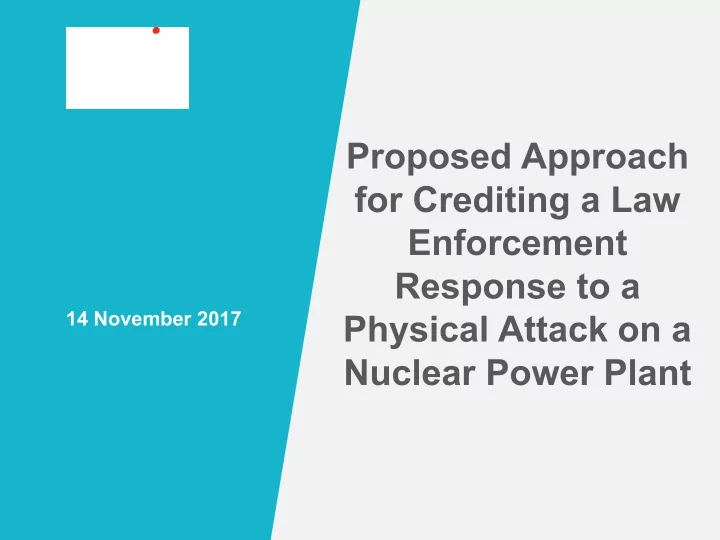

Proposed Approach for Crediting a Law Enforcement Response to a 14 November 2017 Physical Attack on a Nuclear Power Plant
U.S. Security Programs • U.S. Nuclear Regulatory Commission – Ensures that licensee security programs and contingency plans deal with threats, thefts, and sabotage relating to special nuclear material, high-level radioactive wastes, nuclear facilities, and other radioactive materials and activities that the NRC regulates – NRC description 2
Physical Protection Based on Stand-Alone Response Current U.S. NRC policy is that a licensee is expected to defend against the Design Basis Threat (DBT) without external assistance 3
NEI Paper - Desired Outcome Allow U.S. power reactor licensees to credit a law enforcement tactical response supporting performance of operator actions to prevent or mitigate radiological sabotage 4
Challenge Develop a basis that provides reasonable assurance that a law enforcement tactical team can enable performance of an operator action to prevent radiological sabotage during an attack on a nuclear facility: • Tactical team capabilities • Concept of operations • Procedures • Personnel and equipment • Training and drills 5
Security Bounding Time (SBT) • SBT is the elapsed time, measured from the beginning of an attack, required for a law enforcement tactical team to eliminate potential or actual adversary interference sufficient to enable performance of an operator action – Joint planning and agreements with a law enforcement agency – Establish security program elements necessary to gain a SBT, and for maintenance and periodic verification – Due to differences in law enforcement tactical response capabilities from site-to-site, the use of the SBT process by a licensee will be voluntary 6
7
Site Actions • Identify the operation action • Planning and procedure development • Verify and validate • Obtain a Letter of Agreement • Determine the Security Bounding Time 8
Determine SBT Considers four elapsed time components: Using the sum of these four elapsed times, the licensee will consult a table to determine the site-specific SBT 9
NRC & Stakeholder Engagement • Public meetings • Public meetings • Commissioners • Management • Closed meetings • Closed meetings • Management • Advisory Committees • Drop-in meetings • Drop-in meetings • Technical Staff • Working Groups • Other interactions • Other interactions 10
Thank You Susan Perkins-Grew spg@nei.org Senior Director Nuclear Security & Incident Response
Recommend
More recommend